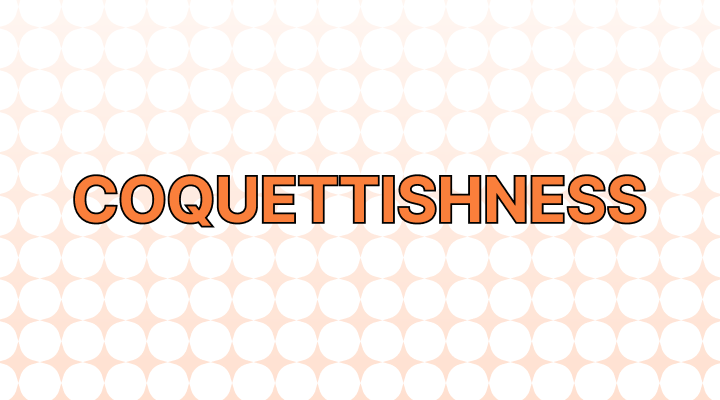Coquettishness refers to the quality or behavior of being flirtatious, playful, or teasing in a typically insincere way that is meant to attract attention and admiration. It often involves behaving in a charming and flirtatious manner without committing to any serious romantic or emotional involvement.
For example, suppose you have a friend named Sarah. During a social event, Sarah's coquettishness is evident as she playfully twirls her hair, exchanges lingering glances, and engages in light-hearted conversations with several attendees. Her subtle flirtatious behavior captured the interest of many men in the room, leaving them charmed by her coquettish charm. Sarah may not be emotionally invested in the men she flirts with, but she wants their attention and interest. She may act coy, pretending to be modest and shy to seem charming.
Coquettishness is more heavily associated with women than men, and it is seen as an ingenuine form of attracting attention in a flirtatious and playful manner that is not serious.
Example sentences
- Her coquettishness was evident in the way she batted her eyelashes and giggled coyly.
- The actress portrayed her character's coquettishness perfectly.
- He couldn't help but be drawn to her coquettishness and alluring demeanor.
- Jane's coquettishness was captivating, making it hard for anyone to resist her charms.
- The coquettishness in her voice added an enchanting quality to her performance.
- His coquettishness was a deliberate attempt to make her feel at ease.
- The coquettishness in her smile suggested a playful invitation.
- Her coquettishness was magnetic, drawing everyone's eyes to her.
- He found her coquettishness charming and endearing.
- The coquettishness of her words left him intrigued and curious.
Want to sound like a native speaker?
Engram’s AI-powered grammar checker makes your English sound like a native speaker’s, suggesting natural English expressions on top of fixing grammar, spelling, punctuation, word order, and vocabulary.

Reference:
















